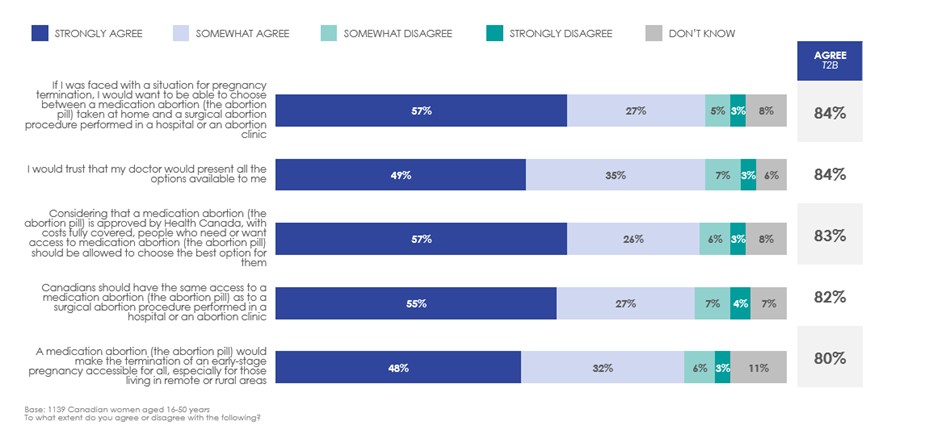More than 8 in 10 Canadian women strongly advocate for availability and access to the two abortion options in Canada and autonomy of choice
Toronto, ON, May 24, 2023 — Women’s reproductive rights, sexual health and abortion have been leading topics of discussion worldwide following the overturn of Roe v Wade in America. A recent Ipsos poll carried out on behalf of Linepharma International, conducted among 1,139 Canadian women aged 16-50, shows that 62% are concerned about their reproductive rights in Canada following the reversal of Roe vs. Wade in the USA. This poll strived to learn about their current knowledge of abortion methods, preferences and availabilities of options present in Canada. While 8 in 10 Canadian women express strong support for a choice of abortion methods to be available and accessible to all, there are gaps in their knowledge that were highlighted.
6 in 10 Canadian women are confident in their knowledge of abortion methods, at the same time, 6 in 10 still have difficulties differentiating with the Plan B pill
There are two types of abortion methods that are used to terminate a pregnancy. This includes a surgical abortion procedure that is often performed in a hospital or an abortion clinic and a medication abortion, commonly referred to as an abortion pill, that can be taken at home.
More than 6 in 10 Canadian women feel that they are knowledgeable (very/somewhat) about both abortion methods - surgical abortion (63%) and medication abortion (63%). However, less than 2 in 10 can confidently state they are ‘very knowledgeable’ about either methods (19% surgical, 16% medication).
Additionally, Canadians were tested on their knowledge of the Plan B pill (the morning-after pill), an emergency contraceptive (birth control), that is useful within 72 hours of unprotected sex. Self-reported awareness of the Plan B pill was higher, with more than 7 in 10 saying they are knowledgeable (very/somewhat) about the Plan B pill (73%) including 23% who feel they are ‘very knowledgeable’.
Nonetheless, when asked if ‘Plan B /the morning-after pill is the same as medication abortion (the abortion pill)’, only 44% of Canadian women aged 16-50 recognize this to be false. 4 in 10 (37%) are not sure about the difference and 2 in 10 (18%) falsely believe the Plan B pill and medication abortion to be the same.
While there are gaps in knowledge of available options, Canadian women feel strongly about the autonomy to choose and to have access to the various abortion methods
When it comes to awareness about the abortion options available in Canada, 73% are aware that Canadians have access to surgical abortion while only 58% believe they have access to medication abortion. About 2 in 10 (20%) Canadian women aged 16-50 are unsure of the options they have access to, with teenagers appearing to be the most unsure (16-17 yrs: 33% unsure). While almost 8 in 10 (79%) Canadians acknowledge there is at least one abortion method (either surgical or medication) available to Canadians, only 52% are aware that they have access to both methods (surgical and medication).
At the same time, there is a lack of awareness on which abortion method costs are fully covered by provincial plans, with only 40% believing it is true for surgical abortion (10% false) and 27% true for medication abortion (16% false). Almost half remain unsure if their provincial plan fully covers the cost of surgical abortion (50% unsure) or medication abortion (56% unsure).
Subsequently, it is not unsurprising that only 57% agree (strongly/somewhat) with the statement ‘I know enough about the options on safely terminating a pregnancy’, further highlighting the gaps in knowledge.
Despite the gaps in knowledge, when asked about their opinion on the availability of options, most Canadians believe that both medication abortion and surgical abortion should be available and accessible for Canadians to choose from. Over 8 in 10 Canadian women aged 16-50 agree (strongly/somewhat) that they want to be able to choose between the abortion options (84%), people who need or want access to medication abortion should be allowed to choose the best option for them (83%), trust that their doctor would present all the options available (84%), believe that Canadians should have the same access to both methods (82%) and that a medication abortion would make early-stage pregnancy termination accessible for all (80%).

Preference for medication abortion is higher, 64% would be comfortable having a medication abortion at home based on a telemedicine prescription
If faced with a situation for pregnancy termination, 40% of Canadian women express a preference towards a medication abortion, followed by 31% who would choose a surgical abortion procedure. About a quarter (24%) are unsure of which option will be their first choice and 5% prefer not to disclose their preference.
Preference for medication abortion is lowest in Alberta (29%), followed by Quebec (34%), compared to British Columbia (47%) and the Atlantic provinces (49%) where almost half would opt for the abortion pill. Conversely, the preference for surgical abortion is lowest among residents of British Columbia (24%) and Ontario (29%), compared to Quebec (38%).
Preference for methods of pregnancy termination*: By Age and Region
|
|
16-17 |
18-24 |
25-40 |
40+ |
BC |
AB |
SK/MB |
ON |
PQ |
ATL |
|
A surgical abortion procedure - performed in a hospital or an abortion clinic |
14% |
30% |
31% |
33% |
24% |
33% |
32% |
29% |
38% |
28% |
|
A medication abortion (the abortion pill) that can be taken at home |
41% |
47% |
41% |
35% |
47% |
29% |
44% |
42% |
34% |
49% |
|
I'm not sure / I don't know |
36% |
16% |
23% |
28% |
27% |
28% |
19% |
24% |
23% |
21% |
|
Prefer not to say |
8% |
7% |
5% |
4% |
2% |
10% |
5% |
5% |
4% |
2% |
*If you were faced with a situation for pregnancy termination, please indicate which of the following options would be your first choice. Please remember your honest responses are very helpful and will remain anonymous.
At the same time, when asked about comfort around having a medication abortion at home if it was prescribed through telemedicine, 64% agree that they would be comfortable (32%: Strongly Agree, 33%: Somewhat agree). 24% do not agree (10%: Strongly disagree, 14%: Somewhat disagree) and 12% remain unsure/don’t know.
Canadian women first turn to doctors for information about abortion
Around 6 in 10 Canadian women aged 16-50 will first turn to their doctor (58%) if they were seeking information about abortion. This is followed by 2 in 10 who will turn to online sources (20%). Less than 1 in 10 would turn to their family (6%), friends (6%) or pharmacist (4%). However, teenagers (16-17 yrs: 36% family members) are much more likely to go to family members for information, almost at an equal footing as doctors (16-17 yrs: 41% my doctor).
About the Study
These are some of the findings of an Ipsos poll conducted between Oct 21 – Nov 04, 2022, on behalf of Linepharma International. For this survey, a sample of 1,139 Canadian women aged 16-50 was interviewed. Quotas and weighting, via age and region (provinces), were employed to ensure that the sample’s composition reflects that of the Canadian population according to census parameters.
Where results do not sum to 100 or the ‘difference’ appears to be +/-1 more/less than the actual, this may be due to rounding, multiple responses, or the exclusion of don't knows or not stated responses.
The precision of Ipsos online polls is measured using a credibility interval. In this case, the poll is accurate to within ± 3.3 percentage points, 19 times out of 20, had all Canadian women aged 16-50 been polled. The credibility interval will be wider among subsets of the population. For more information on Ipsos’s use of credibility intervals, please visit the Ipsos website.
All sample surveys and polls may be subject to other sources of error, including, but not limited to coverage error, and measurement error.
For more information on this news release, please contact:
Sanyam Sethi
Vice President, Public Affairs, Ipsos Canada
+1 416 324-2307
[email protected]
Hyejin Park
Research Analyst, Public Affairs, Ipsos Canada
+1 437 246-2681
[email protected]
About Ipsos
Ipsos is the world’s third largest market research company, present in 90 markets and employing more than 18,000 people.
Our passionately curious research professionals, analysts and scientists have built unique multi-specialist capabilities that provide true understanding and powerful insights into the actions, opinions and motivations of citizens, consumers, patients, customers or employees. We serve more than 5000 clients across the world with 75 business solutions.
Founded in France in 1975, Ipsos is listed on the Euronext Paris since July 1st, 1999. The company is part of the SBF 120 and the Mid-60 index and is eligible for the Deferred Settlement Service (SRD).
ISIN code FR0000073298, Reuters ISOS.PA, Bloomberg IPS:FP www.ipsos.com



